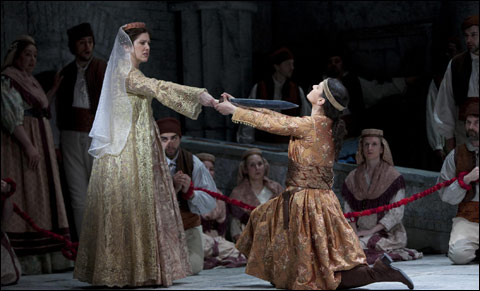
IDOMENEO Sandra Piques Eddy’s Idamante is the one person on stage with true dignity and an inner life. |
Much beautiful music turns up in the 18th-century operatic form that’s probably most alien to a modern audience: opera seria (“serious opera”) — a highly stylized, stiffly formal mode (often on obscure classical subjects involving some interference from the gods), with long repetitious arias dealing with abstract notions of love, heroism, and sacrifice, and (before Mozart) little vocal interaction. Mozart wrote two of the best — one when he was 24, one right before he died. The early Idomeneo, re di Creta (“Idomeneo, King of Crete”) closes Boston Lyric Opera’s season (Shubert Theatre, through May 4).
I’ve been to three memorable local Idomeneos, and they all had one thing in common: they were performed in concert, thus avoiding the problem of how to stage a lone singer going on at great length while everything else comes to a halt. Singers with magnificent voices, the ability to inhabit a character, and the power to move us deeply (those earlier casts included the cream of local vocalists — the sublime Lorraine Hunt Lieberson in two different roles, Jeanne Ommerlé, Susan Larson, Sanford Sylvan, Richard Conrad — and the legendary Metropolitan Opera diva Eleanor Steber ending her great career with a fabulous flourish), and conductors like Craig Smith and Roger Norrington — who can both caress and illuminate the music — make us forget that the stage action is static.
So BLO conductor David Angus and stage director Lillian Groag faced big challenges, and I wish I could say they’ve met them. The most familiar music is the Overture, and Angus, music director of Glimmerglass Opera (Glimmerglass also provided sets and costumes from its Orphée), leads it with incisive grandeur. But as the opera goes on, he seems to lose his feeling for Mozart’s mercurial variety. Does he love this score, or is he just eager to get through it?
Groag had the harder job, but her staging lacks drama, imagination, style, nuance, and even taste. The production is a bore. Except for some stock gestures, we see nothing that reveals or individualizes a character. Instead of mythic heroes, we’ve got (with one exception) characters who act like a dysfunctional middle-class family (or, worse, opera singers). Groeg’s unhelpful (because undramatic) “conception” seems to be that a community of 18th-century Cretans is acting this story out at a local Neptune festival. (That’s actually not so clear, in part because the set-up comes during — and distracts us from — the Overture, which was not intended for this purpose.) The opera’s inherent formality already creates too much distance from the characters; Groag pushes us even farther away from them. And since (with the same exception) the acting is pretty amateurish, and most of the singing far from ravishing, it’s hard to generate much interest, let alone sympathy.